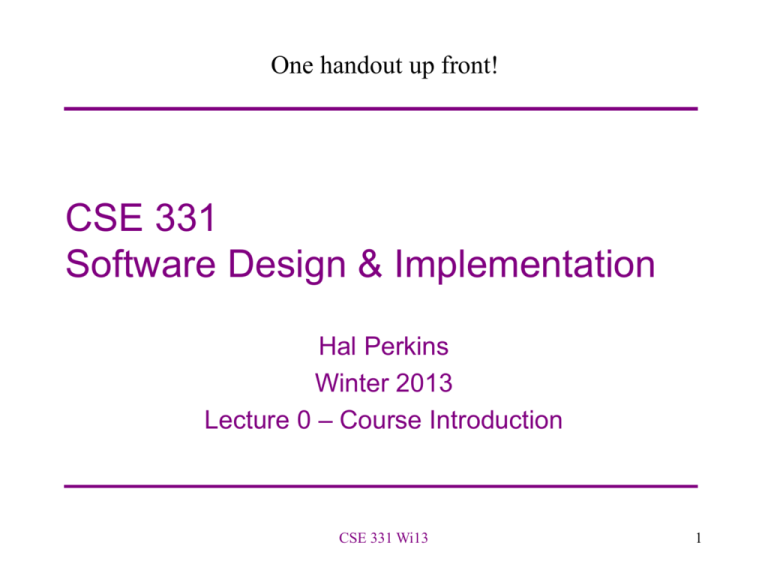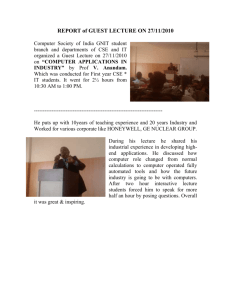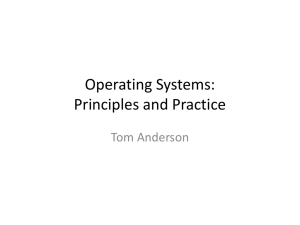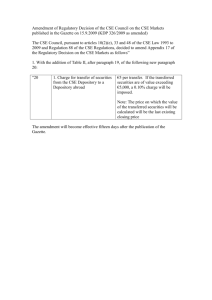CSE 374 Programming Concepts & Tools
advertisement

One handout up front! CSE 331 Software Design & Implementation Hal Perkins Winter 2013 Lecture 0 – Course Introduction CSE 331 Wi13 1 Course staff • Lecturer: – Hal Perkins • TAs: – Wing Lam – David Mailhot – Lindsey Nguyen – James Okada – Ryan Tsoi Ask us for help! CSE 331 Wi13 2 Welcome! • We have 10 weeks to move to a level well above novice programmer: – Larger programs – Principled, systematic programming: What does it mean to get it right? How do we know when we get there? What are best practices for doing this? – Effective use of languages and tools: Java, IDEs, debuggers, JUnit, JavaDoc, svn • The principles are ultimately more important than the details – (Yeah, right…) CSE 331 Wi13 3 Main topic: Managing complexity • Abstraction and specification – Procedural, data, and control flow abstractions – Why they are useful and how to use them • Writing, understanding, and reasoning about code – The examples are in Java, but the issues are more general – Object-oriented programming • Program design and documentation – What makes a design good or bad (example: modularity) – The process of design and design tools • Pragmatic considerations – Testing – Debugging and defensive programming – Managing software projects CSE 331 Wi13 4 The goal of system building • To create a correctly functioning artifact! • All other matters are secondary – Many of them are essential to producing a correct system • We insist that you learn to create correct systems – This is hard (but fun and rewarding!) CSE 331 Wi13 5 Why is building good software hard? • Large software systems are enormously complex – Millions of “moving parts” • People expect software to be malleable – After all, it’s “only software” – Software mitigates the deficiencies of other components • We are always trying to do new things with software – Relevant experience often missing • Software engineering is about: – Managing complexity – Managing change – Coping with potential defects • Customers, developers, environment, software CSE 331 Wi13 6 Programming is hard • It is surprisingly difficult to specify, design, implement, test, debug, and maintain even a simple program • CSE 331 will challenge you • If you are having trouble, think before you act – Then, look for help • We strive to create assignments that are reasonable if you apply the techniques taught in class… … but likely hard to do in a brute-force manner CSE 331 Wi13 7 Prerequisites • Knowing Java is a prerequisite – We assume you have mastered 142 and 143 Examples: • Sharing: – Distinction between == and equals() – Aliasing (multiple references to the same object) • Subtyping – Varieties: classes, interfaces – Inheritance and overriding • Object-oriented dispatch: – Expressions have a compile-time type – Objects/values have a run-time type CSE 331 Wi13 8 Logistics • 3 lectures/week + 1 section – You are responsible for what happens, even if you skip a day (but contact us if it is an emergency) • All course materials are on the web (often after class): but TAKE NOTES! • Communications: – Discussion board (not Delphic oracle) • Post/reply and it’ll keep track of your new stuff – Mailing list: messages from course staff to everyone (you are subscribed if you are enrolled; you are responsible for messages sent to the list) CSE 331 Wi13 9 Requirements • Primarily programming assignments but some written problem sets, approximately weekly (55%) • 1 midterm (15%), 1 final (25%) • 5% online quizzes, exercises, citizenship, etc. • Collaboration: individual work unless announced otherwise; never look at or show your code to others • Extra credit: when available, small effect on your grade if you do it – no effect if you don’t • We reserve the right to adjust percentages as the quarter evolves to reflect the workload CSE 331 Wi13 10 Academic Integrity • Policy on the course web. Read it! • Do your own work – always explain any unconventional action on your part • I trust you completely • I have no sympathy for trust violations – nor should you • Honest work is the most important feature of a university (or engineering, or business). It shows respect for your colleagues and yourself. CSE 331 Wi13 11 Deadlines • Turn things in on time! • But things happen, so … – You have 4 late days for the quarter for assignments (not quizzes, exercises) – No more than 2 per assignment – Counted in 24 hour chunks (5 min = 24 hours late) – If group projects, can only use if both partners have late days and both partners are charged • That’s it. No other extensions (but contact instructor if you are hospitalized) • Advice: Save late days for the end of quarter when you (might) really need them CSE 331 Wi13 12 Resources – Books Required (assigned readings, some online quizzes) – every serious programmer should read these • Pragmatic Programmer, Hunt & Thomas • Effective Java 2nd ed, Bloch – Will be more proactive about quizzes, readings this quarter Decent “Java book” if you want one • Core Java Vol I, Horstmann CSE 331 Wi13 13 You have homework! • Exercise 0, due online by 10 am Wednesday – Links went live right before class • Write (don’t run!) an algorithm to rearrange the elements in an array – And argue that your solution is correct! • No late submissions accepted on exercises or quizzes (late days are only for larger homework / programming assignments) CSE 331 Wi13 14 Work to do! • If you’re still trying to add the course, please sign the info sheet before leaving today • Fill in the Office Hours Doodle on the web site – We’re trying to get an idea what would be most useful • Post an answer to the welcome message on the discussion list (get catalyst to track new postings for you) • Exercise 0 due by 10 am Wed. • So let’s get going… – Before we create masterpieces we need to hone our technique…. CSE 331 Wi13 15




